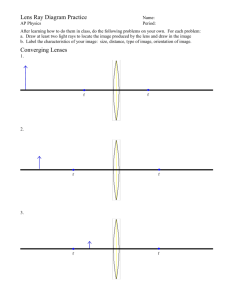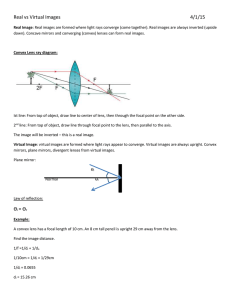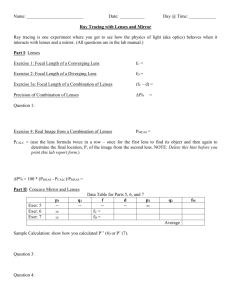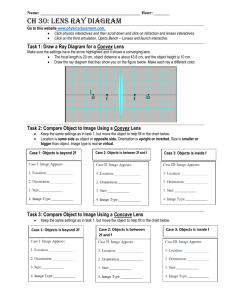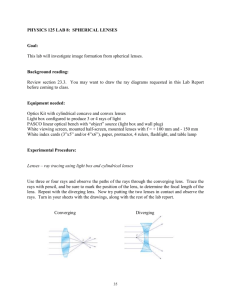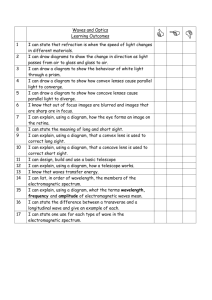Ray Diagrams
advertisement
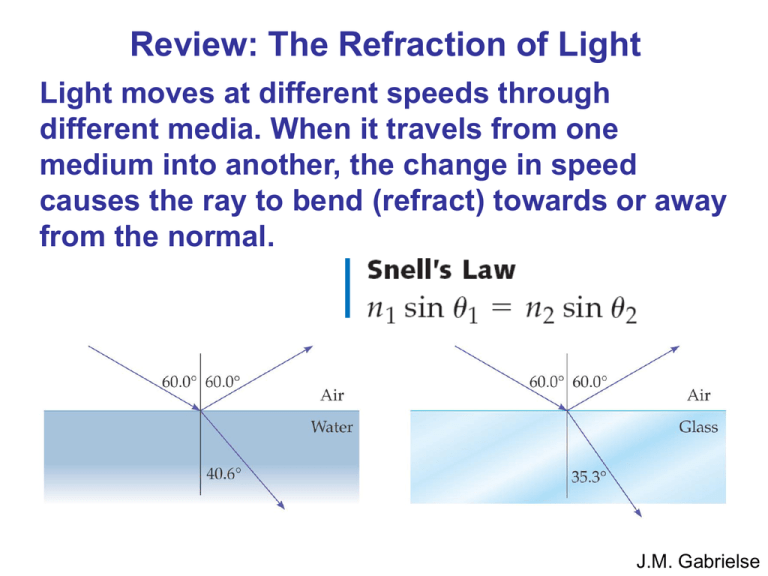
Review: The Refraction of Light Light moves at different speeds through different media. When it travels from one medium into another, the change in speed causes the ray to bend (refract) towards or away from the normal. J.M. Gabrielse Something else: The angle of refraction is related to the different speeds: J.M. Gabrielse Refraction (bending light) Refraction is when light bends as it passes from one medium into another. normal air θi When light traveling through air passes into the glass block it is refracted towards the normal. glass block θr When light passes back out of the glass into the air, it is refracted away from the normal. Since light refracts when it changes mediums it can be aimed. Lenses are shaped so light is aimed at a focal point. θi θr air normal J.M. Gabrielse Ray Tracing for Lenses Lenses are used to focus light and form images. There are a variety of possible types; we will consider only the symmetric ones, the double concave and the double convex. J.M. Gabrielse Concave Lenses Concave lenses are thin in the middle and make light rays diverge (spread out). • F optical axis If the rays of light are traced back (dotted sight lines), they all intersect at the focal point (F) behind the lens. J.M. Gabrielse Concave Lenses • F optical axis Light rays that come in parallel to the optical axis diverge from the focal point. The light rays behave the same way if we ignore the thickness of the lens. J.M. Gabrielse Concave Lenses • F optical axis Light rays that come in parallel to the optical axis still diverge from the focal point. J.M. Gabrielse Lenses The first telescope, designed and built by Galileo, used lenses to focus light from faraway objects, into Galileo’s eye. His telescope consisted of a concave lens and a convex lens. light from object convex lens concave lens Light rays are always refracted (bent) towards the thickest part of the lens. J.M. Gabrielse Convex Lenses Convex lenses are thicker in the middle and focus light rays to a focal point in front of the lens. The focal length of the lens is the distance between the center of the lens and the point where the light rays are focused. J.M. Gabrielse Convex Lenses • F optical axis J.M. Gabrielse Convex Lenses • F optical axis Light rays that come in parallel to the optical axis converge at the focal point. J.M. Gabrielse Ray Tracing for Lenses The three principal rays for lenses are similar to those for mirrors: • The incident ray that runs parallel to the PA will refract through the principle focus • A incident ray that goes through the principle focus will refract parallel to the PA • The incident ray that goes through the optical centre does not refract, assuming the lens is thin enough, it will not be deflected. • This is the thin-lens approximation. J.M. Gabrielse Ray Tracing for Lenses These diagrams show the principal rays for both types of lenses: J.M. Gabrielse Ray Tracing for Lenses As with mirrors, we use these principal rays to locate the image: J.M. Gabrielse Ray Tracing for Lenses The convex lens forms different image types depending on where the object is located with respect to the focal point: J.M. Gabrielse J.M. Gabrielse J.M. Gabrielse Text work Read P 556-560 for extra support Complete worksheets Do#5-7 J.M. Gabrielse Thanks/Further Info • Faulkes Telescope Project: Light & Optics by Sarah Roberts • Fundamentals of Optics: An Introduction for Beginners by Jenny Reinhard • PHET Geometric Optics (Flash Simulator) • Thin Lens & Mirror (Java Simulator) by Fu-Kwun Hwang J.M. Gabrielse
